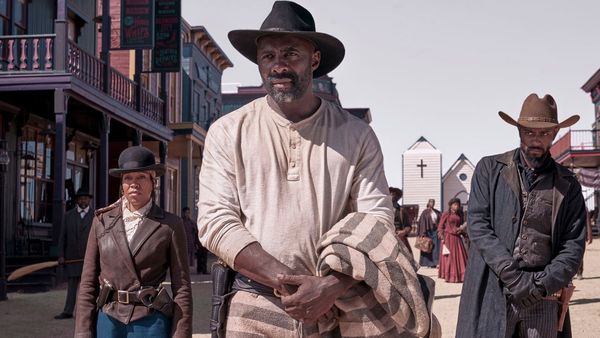Eye For Film >> Movies >> The Harder They Fall (2021) Film Review
The Harder They Fall
Reviewed by: Jennie Kermode

What is it about cowboys that makes them so appealing to so many people? Cinema offers no shortage of heroes – yet unlike detectives, sports stars, archaeologists, spies and astronauts, a cowboy is something that almost anyone with a certain level of physical strength and fitness can become, without the need for formal education or even much in the way of training. It should come as no surprise, then, that African Americans, at the bottom of the social heap in the old West, often chose that means of making a living. Historians believe that they actually made up one in four of the cowboy population. So why do we see so little of them in westerns? There are black screen cowboys out there, but they’re few and far between; films centred on them still more so. Netflix’s The Harder They Fall is a long overdue attempt to redress the balance.
For a long time, what kept films with black leads from getting studio funding was a supposed shortage of bankable talent. This film has talent in abundance. In fact, one of its weaknesses is that writers Jeymes Samuel and Boaz Yakin have gone out of their way to showcase numerous dynamic performances, all entertaining in their own right but sometimes crowding the narrative where it would have benefited from a tighter structure. It also packs in too many clever references (though they’re beautifully delivered) and too much distracting name-dropping (though it’s charmingly irreverent and doesn’t make the mistake of trying to be biographical). In this type of story it really is possible to have too much of a good thing, but whilst this detracts from its impact, it’s still a pleasure to watch.
Jonathan Majors, fresh from Lovecraft Country, plays Nat Love, a man intent on revenge. In flashback we see him as a boy, the sole survivor of a violent incursion into his home by notorious outlaw Rufus Buck (Idris Elba). Elba has been making a habit of playing authority figures of late and brings that cool, confident air to this character, who has had some 20 years to solidify his position by the time the two cross paths again. Such is his reputation that he continues to wield power from inside a jail cell – until the ferocious Trudy (Regina King) mounts a daring rescue in a speeding train, and he returns to reclaim full control of his favourite boom town from former partner Wiley (Deon Cole). In the meantime, however, Love has had time to develop a reputation of his own, and has acquired some formidable sidekicks, not least his sometime lover Stagecoach Mary (Zazie Beetz), a casino owner who knows how to look after her interests. Buck is an immovable object, Love an unstoppable force. The only thing that’s certain is that when they meet, there will be a lot of collateral damage.
When it comes to action, Samuel, directing, really knows his stuff. The set pieces are not only thrilling to watch but exhibit a deep knowledge of the genre and its stylistic potential. Great production design and costuming add to the effect. Everything is elevated to an almost cartoonish level, but the performances are big enough to carry it, with Elba maintaining a calm presence at the centre. Samuel doesn’t try to set a moral tone – these characters are all outsiders, scraping by alongside a white society which we rarely see but whose influence is heavily felt. There’s something liberating about this, as it allows for a more honest portrait of outlaw society; although the storyline and shot choices keep us with Love, he gets little more wriggle room than the average hero, and Majors uses this well.
Despite the gorgeous open landscape shots, there’s an insular feeling about the film, with one double cross after another playing out within an established group of characters who don’t seem to interact much with anyone outside their immediate circles. Whilst white people are understandably pushed to the margins, Native people are completely absent, which feels odd in this context. Something Samuel does well, however, is to bring forward female characters who exhibit the kind of toughness required to survive in that environment. There’s an unfortunate moment when Mary is pushed into girlfriend-available-for-kidnap mode, but even then, she never comes across as fragile. Meanwhile there’s a great turn from Danielle Deadwyler as Cuffee Williams, a character who seems to be non-binary and acts as a reminder that queer people, too, existed in the West, doing what they had to do in order to get by.
The Harder They Fall isn’t perfect but it’s a landmark contribution to the genre, and is delivered with an appropriate level of panache. If it sometimes feels like several different westerns working together as a team, that ought to make it even clearer how much potential has gone untapped and how many great stories are waiting to be told.
Reviewed on: 21 Jan 2022














